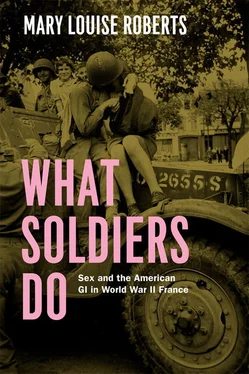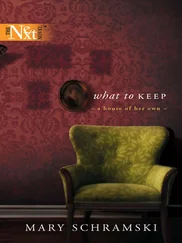Mary Louise Roberts
WHAT SOLDIERS DO
Sex and the American GI in World War II France
Dedicated in loving memory to my parents
EMMIE ROBERTS AND JAMES H. ROBERTS
Map of Normandy and Brittany

It gives me great pleasure to thank the many sources of funding I received to research and write this book. I am grateful to the John Simon Guggenheim Memorial Foundation for making possible a research leave during the academic year 2007–8. The Institute for Research in the Humanities at the University of Wisconsin provided extremely valuable time to write, both in the spring of 2005 as a visiting fellow and in the last two years as a senior fellow. I am most in debt to the truly extraordinary resources at the Graduate School of the University of Wisconsin–Madison, which provided me with a Vilas Associate Fellowship in 2005, a sabbatical in the spring of 2010, and generous summer grants throughout the research process. The support of the Graduate School has deeply enriched my life as a scholar and significantly broadened my research horizons. I am indebted to Judith Kornblatt and Susan Cook, in particular, for their support. In addition to these sources, the Center for European Studies at the University of Wisconsin provided travel funds at a key moment in my research, and the Women’s Studies Research Center provided crucial time away from teaching in the spring of 2009. Finally, a grant from the University of Wisconsin System Institute on Race and Ethnicity made it possible for me to obtain the very costly court-martial transcripts from the US Army Judiciary.
One of the pleasures of writing What Soldiers Do has been the discovery of the French departmental and municipal archives. For their extremely courteous, warm, and professional guidance, I would like to thank Sylvie Barot at Les Archives Municipales de la Ville du Havre; Manonmani Restif at Les Archives Départementales de la Marne; Bruno Corre and Fabrice Michelet at Les Archives Départmentales du Finistère, Patrick Héliès at Les Archives Départmentales du Morbihan, and Louis Le Roc’h Morgère at Les Archives Départmentales du Calvados. I am particularly indebted to Alain Talon at Les Archives Départementales et du Patrimoine de la Manche for his generosity with time and resources. Also in Normandy, Stéphane Simonnet, Directeur Scientifique at Le Mémorial de Caen, could not have been more welcoming and helpful. In Paris, Françoise Gicquel and Grégory Auda at Les Archives de la Préfecture de la Police and Anne-Marie Pathé at the Institut d’Histoire du Temps Présent gave me excellent guidance. In the United States, I received superb help from Kenneth Schlessinger at the National Archives, David Keough at the US Army Military History Institute, and Steven Fullwood at The Schomburg Center for Research in Black Culture.
What Soldiers Do sometimes took me far away from my own field of France and gender, and much of the book could not have been written without the help of the American historians at the University of Wisconsin–Madison. I would like to thank John Cooper, Nan Enstad, John Hall, Susan Johnson, and Will Jones for their vital guidance and criticism. Stan Kutler provided me with contacts at the National Archives, as well as much-appreciated early enthusiasm for the project. In doing so, he gave me the confidence to venture into something completely new. For their critical readings and support, I would also like to thank Suzanne Desan, Fran Hirsch, Florencia Mallon, David McDonald, David Sorkin, Steve Stern, and John Tortorice. Stan Payne read a draft of the whole book and gave me the benefit of his vast knowledge of the Second World War. Laird Boswell also read the entire manuscript with the utmost care and precision; I am so lucky and grateful to be his colleague and friend.
Beyond Madison, I want to thank the anonymous readers for the University of Chicago Press and Oxford University Press. Their incisive suggestions made What Soldiers Do a much better book. Once again Susan Bielstein has been an extraordinary editor, providing general wisdom and detailed criticism in equal measure. I so appreciate her belief in this book. It has also been a great pleasure to work with Mark Reschke and the efficient, quick-witted Anthony Burton. Despite illness, Dor Hesselgrave shared his memories of Paris with me in the last months of his life; I am so thankful to him and to Gwenyth Claughton for putting us in touch. André Lambelet, Adriane Lentz-Smith, Bronson Long, Rebecca Pulju, and Tyler Stovall all provided invaluable research leads and critical readings. Ellen Amster, Holly Grout, Jeffrey Merrick, and Dan Sherman of the Wisconsin French History group offered extremely helpful comments on a draft of chapter 5, as did the anonymous readers for French Historical Studies . An earlier version of chapter 6 was published in the American Historical Review ; I am very grateful for the incisive and meticulous criticism I received from the anonymous reviewers at this journal. This book also gained enormously from the audiences in France and the United States who read drafts or listened to talks and offered suggestions, comments, and questions. I would like to thank the hosts who made such encounters possible: Andrew Aisenberg, Marie Chessel, J. P. Daughton, Laura Lee Downs, R. Douglas Hurt, Hilary Miller, Malachi Haim Hacohen, Lloyd S. Kramer, Patricia Lorcin, Sarah Maza, Rachel Nuñez, Stephen Schloesser, Jennifer Sessions, Judith Surkis, Timothy Snyder, Don Reid, and Whitney Walton. I am also deeply appreciative of the French scholars who offered warm collegiality: Patrice Arnaud, Bruno Cabanes, Guillaume Piketty, Jean Quellien, Fabrice Virgili, and particularly Laura Lee Downs and Patrick Fridenson. Andy Myszewski, Jeff Hobbs, and Kelly Jakes provided excellent research assistance. Without a doubt the graduate students at the UW are the center of my intellectual world. I am so fortunate to have them in my life. Finally and most importantly, I want to thank Joan Scott, Bonnie Smith, Christine Stansell, and William Reddy for being so supportive of my career as a scholar. Without them, this book would not have been possible.
While writing What Soldiers Do was mostly a solitary journey, I was greatly helped along the way—body, mind, and soul—by Jeff Liggon, Katy Nelson, and the inspiring women at Zucca Pilates. May Fraydas is a reason to get up on Sunday morning, and every other day, for that matter. My three older sisters, Elizabeth Baer, Pamela Bonina, and Katherine Gaudet, are more precious to me than they could ever know. Susan Zaeske has given me days of her life researching in the National Archives, and countless hours editing every chapter of What Soldiers Do . Her skills as a historian and an editor are formidable, and her contribution to the book is beyond measure. Her belief in me has made all the difference in my life.
What Soldiers Do is dedicated to the memory of my parents, Emmie and Jim Roberts. I wrote it while grieving their deaths in 2006 and 2007. The years I explore in this book were pivotal for my parents. In 1944, the two met and fell in love while my father served in the navy. The next year they married, and in March 1946, they welcomed their first child into the world. Although my father had his doubts about a book on “what went wrong in Normandy,” he knew me well enough not to question my patriotism. In writing What Soldiers Do , I have tried to live up to the standards of honesty and integrity he and my mother modeled throughout their lives. Following my father’s gift for seeing humor in all things, I have also tried to make the book not only serious but fun.
Читать дальше













